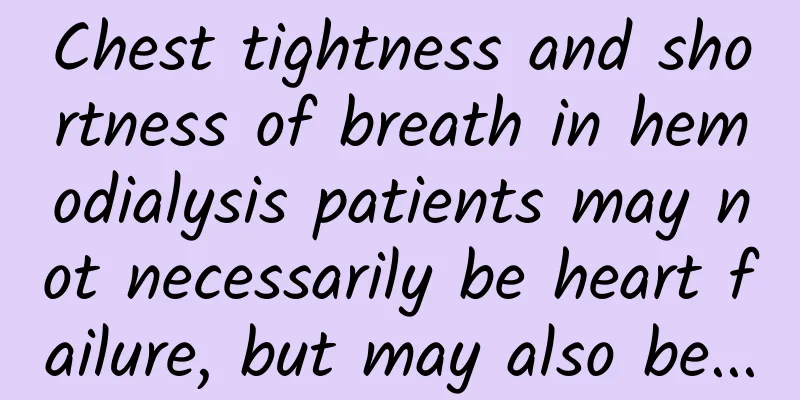Chest tightness and shortness of breath in hemodialysis patients may not necessarily be heart failure, but may also be...

|
Maintenance hemodialysis is a commonly used method for treating end-stage renal disease in clinical practice. However, hemodialysis can only replace part of the kidney function and it is difficult to ensure that the patient's body functions are completely normal. Therefore, patients are very likely to have emotional problems, the most common of which are anxiety and depression, which seriously affect the patient's quality of life and even cause chest tightness, shortness of breath, and chest pain. Anxiety and depression in hemodialysis patients are significantly negatively correlated with their quality of life, so they should pay more attention to their mental state. Hemodialysis patients often use the 9-item Patient Health Questionnaire (PHQ-9) to screen themselves for anxiety and depression. This scale includes depression and anxiety, and is suitable for screening depression and anxiety. If you suspect that you have a psychological disorder, you can take a simple preliminary test with the PHQ-9 (Table 1). Table 1 Questions and scoring references for the PHQ-9 self-assessment scale Scoring statistics: ●0-4 points: no depression (pay attention to take care of yourself). ●5 to 9 points may indicate mild depression (consulting a psychologist or psychological medicine worker is recommended). ●10 to 14 points may indicate moderate depression (it is best to consult a psychologist or psychiatrist). ●15 to 19 points may indicate moderate to severe depression (consulting a psychologist or psychiatrist is recommended). ●A score of 20 to 27 may indicate severe depression (be sure to see a psychologist or psychiatrist). It should be emphasized that the results of the self-measurement scale can only provide a reference, and you should go to the hospital to listen to the diagnosis or guidance of professionals. Especially for hemodialysis patients, the pain, fatigue, sleep disorders, and decreased concentration caused by dialysis treatment and kidney disease itself overlap with anxiety and depression symptoms. The diagnosis is relatively complicated and requires professional doctors to make judgments. For depression and anxiety in maintenance hemodialysis patients, current guidelines recommend selective serotonin reuptake inhibitors as the first choice for treatment. For patients who are already undergoing hemodialysis, non-drug treatments are relatively safe and effective, such as cognitive behavioral therapy, biofeedback therapy, exercise therapy, etc. Cognitive behavioral therapy is a psychological intervention that includes health education and spiritual support. It mainly helps patients understand the disease, overcome psychological barriers, and improve their compliance with treatment by correcting their irrational negative cognition. It can improve the negative emotions of patients with anxiety and depression. Biofeedback therapy uses modern scientific instruments to provide feedback on human information, allowing patients to conduct conscious mind control and psychological training, thereby preventing and treating physical and mental diseases. Exercise therapy evaluates the patient's organic lesions, emotional disorders, and motor abilities, and formulates appropriate exercise prescriptions for treatment based on the principle of individualization. Other studies have shown that traditional Chinese medicine treatment can significantly improve anxiety and depression in hemodialysis patients and improve the effectiveness of treatment, involving acupuncture therapy, acupoint application, abdominal vibration therapy, emotional therapy, five-tone therapy, and health-preserving qigong. The continuous treatment of hemodialysis patients will not only bring inconvenience to their lives and work, but also make them feel helpless and disappointed due to the continuous expenditure of treatment expenses, the reduction of family responsibilities, the reduction of personal social space, and the reduction of personal social value, which will cause depression and anxiety. Therefore, medical workers also need to pay attention to the psychological problems of such patients. Once they experience symptoms such as chest tightness, shortness of breath, and lack of energy, they should consider the possibility of anxiety and depression, conduct timely assessments, and use various drugs and non-drug means to intervene as soon as possible to control the condition. |
Recommend
These bad habits can cause women to suffer from breast cancer!
Breast cancer is a common disease among women. So...
What are the symptoms of adenomyosis?
Many people do not understand adenomyosis, which ...
Will using fake engine oil have any impact on driving? What is fake engine oil made of?
Motor oil is also known as engine lubricant, whic...
At what age do women stop menstruating?
Generally speaking, women will experience menopau...
The reason why my girlfriend's period was delayed by 10 days
We all know that women's menstruation has a c...
What kind of care is needed for fallopian tube obstruction removal surgery
Many female infertility problems are mainly cause...
Why do some people who are heavy smokers don’t get lung cancer, while others who never smoke get lung cancer?
If lung cancer in never smokers were considered a...
How much do you know about these 10 traditional Chinese medicines for strengthening muscles and bones?
Although most Chinese medicines taste bitter, the...
What is Botox? How dare you inject it into your face?
People who love beauty must know about Botox. Man...
Picture of swollen lymph nodes under the armpit
There are many axillary lymph nodes, all of which...
What to eat is good for women's ovaries
Soybeans are really good food and are very suitab...
Exposed! Seized overnight! I ate countless bags of instant noodles and it turned out to be "pig pickled cabbage"!
Are you familiar with this vegetable bun? To be h...
What is the reason for a girl's kidney failure?
Since ancient times, many people have believed th...
How to use metronidazole tablets to treat gynecological inflammation?
Metronidazole is an over-the-counter drug with a ...









